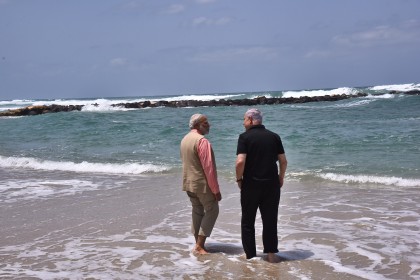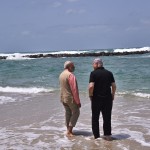Prime Minister Benjamin Netanyahu’s first visit to India, beginning January 14, in New Delhi, coincides, significantly enough, with the first International Bene Israel Festival[1] being held at Navgaon beach, Raigad district, Maharashtra, lying across the harbour from Mumbai. A highlight of the programme is that the congregated global Bene Israel (lit: ‘children of Israel’) community—many of them Israeli from having settled there—will visit the spot where their forebears first arrived on the Indian subcontinent. The immediate agenda is to raise funds for the restoration of a 1980s memorial[2] that marks the site where their predecessors were washed ashore after a shipwreck about 2000 years ago.[3]
Such an event speaks eloquently of the strong ties that India and Israel have shared since 1992, and been strengthened after Prime Minister Narendra Modi took office in May 2014. For example, the simplification of Indian visa forms, combined with many Israeli Indian Jews opting for Overseas Citizenship of India (OCI)—which eliminates the need for a visa—has eased travel between the two countries.
The Israeli Indian Jews are particularly excited also about[4] the modification of a rule—compulsory army service for all Israelis after high school—that kept their children from acquiring an OCI. This has now been done away with.
The prospect of Air India starting a direct flight from Mumbai and Delhi to Tel Aviv has also raised expectations. “This will give a fillip to tourism to India both by Israelis and our Indian communities making more frequent visits here. There is talk already about Israeli budget airlines tapping into this big market,” says Anil Abraham, a Malabar Jew from Ernakulam, an NRI who regularly brings tour groups to India.
The benefits of closer ties are greater for Israel’s 85,000 Indian Jews[5], who are made up of Bene Israel (the Marathi-speaking Jews from the Konkan), Baghdadi Jews (Arabic speaking), with roots in Bombay and Kolkata, the Malabar and Paradesi (foreigner) Jews (Malayalam-speaking) from Cochin, and the tribal Jews of Mizoram and Manipur from India’s North East (who speak a Burmese dialect).

“Relations between India and Israel being recognised is nice because now we can be proud of India, which has always been good to the Jewish people and shown tolerance for all religions,” says Shulamit Koder, an Israeli belonging to the Paradesi Jewish community.
The Paradesis number only 150: Modi’s gift to Netanyahu, a Sefer Torah, a handwritten prayer scroll, dating back to 1908-9, from the oldest surviving synagogue in India, the 450-year-old Paradesi Synagogue in Mattancherry, Kochi[6], made a major impression on them as it underscored the fact of the Indian diaspora having linked the two countries for centuries. (This gift is now housed in the Beit Hatfutsot (Museum of the Jewish People), on the Tel Aviv University campus.)
Noah Massil, editor of the popular Israeli Marathi magazine, Mai Boli, has readers who are mainly from the largest Indian community in Israel, the Bene Israel, who ‘made Aliyah’ (immigrated to Israel) in large numbers in the late 1960s and 70s. He recalls how ties between the two countries were not very open until 1992. “When we began the Festival of Indian Song and Dance in 1987 in Jerusalem, my practice, year after year, was to go up on stage and say that next time, we will have the Indian ambassador as our chief guest. Our wish has been fulfilled since 1992.”
The establishment of the Indian Embassy in Tel Aviv (in 1992) brought cohesion to the four distinct Indian Jewish communities, bringing them together as Indians. Former Indian ambassador, Jaideep Sarkar,[7] encouraged them to unite under a single umbrella association. In 2013 the first National Convention of Indian Jews was held in Ramle , with the support of the Indian Embassy in Israel. This has now become an annual event, held during the Sukkot holidays, with an exception in 2017, when it was held on Hanukkah.[8]
The Israeli Indian communities did network informally: a Paradesi Jew will most likely celebrate Onam with a childhood friend from the Malabar Jewish community; or Diwali may bring together a Bene Israel and a Baghdadi Jew, both hailing from Bombay.
The factors keeping these communities to themselves were largely due to different settlement patterns. As a thumb rule, most Malabar Jews settled in Moshavs (co-operative farms) and Kibbutz (a collective farm), while the Bene Israel lived in development townships, like Beersheba and Dimona, with many in Lod, Ashdod and Ramle, to the south and south east of Tel Aviv. Baghdadis and Paradesis tended to settle in the big cities of Jerusalem, Haifa, and Tel Aviv.
Also, they were building their lives anew under tough circumstances. In the late 1960s Israel was a relatively new nation that had to be built more often than not under war-torn conditions –like the 1967 Six Day War (or Third Arab-Israeli conflict). They tended to find stability, connecting with their own immediate families and community.
A unique legacy
Today, these immigrant families are well assimilated into Israeli society and the knowledge that India-Israel relations can only move forward, has given them greater confidence to reinforce their cultural identity and preserve their legacy in the subcontinent. Members of the Baghdadi Jewish congregation recently carried out extensive restoration on, and rededicated, Kolkata’s Beth El and Magen David synagogues. The forthcoming international festival of the Bene Israel is also a joint effort in much the same direction.
Noticeable too is the yearning among third and fourth generations of immigrant families, many of whom are of mixed Jewish parentage, to connect with their Indian roots. They know that the Indian subcontinent was the only region in the world where their ancestors could live for generations as Jews without religious persecution, irrespective of whether they lived in Hindu or Muslim princely kingdoms. It is in this unblemished history and collective memory that the real soft power of the India-Israel bilateral lies.
Sifra Lentin is Bombay History Fellow at Gateway House.
This article was exclusively written for Gateway House: Indian Council on Global Relations. You can read more exclusive content here.
For interview requests with the author, or for permission to republish, please contact outreach@gatewayhouse.in or 022 22023371.
© Copyright 2018 Gateway House: Indian Council on Global Relations. All rights reserved. Any unauthorized copying or reproduction is strictly prohibited.
End Notes
[1] The International Bene Israel Festival is being organized by the International Organization of Bene Israelis (IOBI) with the Mumbai-based Indian Jewish Federation. The objective of the present Festival is to raise funds for the restoration of the Navgaon memorial and cemetery.
[2] The Navgaon Memorial was designed by Joshua Benjamin, chief architect to the Government of India (1972-78). He is well-known for having designed the Indian Parliament Annexe and the Defence Headquarters building, both in New Delhi.He also designed the Judah Hyam prayer hall in New Delhi.
[3] The Bene Israel believe that only seven men and seven women survived this shipwreck, and the bodies of those who drowned are buried under two mounds at Navgaon cemetery. One mound has the bodies of the men and the other that of the women.
[4] The Indian Prime Minister made this announcement in his 5 July 2017 address to the Israeli Indian community in Tel Aviv. The transcript of this speech can be accessed here.
[5] It is estimated by Bene Israel community leaders that there are about 25,000 Israelis with one Indian Jewish parent, and about 100,000 with one Indian Jewish grandparent.
Wald, Shalom Salamon, and Arielle Kandel, India, Israel And The Jewish People: Looking Ahead, Looking Back 25 Years after Normalization ( The Jewish People Policy Institute, Jerusalem, 2017), pp 153-54.
Also India, Israel and the Jewish people (Accessed on 3 January 2017)
[6] The Paradesi Synagogue (1568) is a UNESCO World Heritage Site, located in Mattancherry, Kochi. According to the last para in the Dedication Plaque of this gift by PM Modi to his Israeli counterpart: “the Paradesi community (of India) has offered this Torah to be gifted to the people of Israel, and housed with the Paradesi Jewish community in Israel, in the name of solidarity and brotherhood between our two great nations”.
[7] Interview with Noah Massil dated 5 January 2018, and Interview with Shulamit Koder dated 8 January 2018.
[8] Interview with Noah Massil on 5 January 2018. The Convention is normally held in cities or townships where there is a large concentration of Indian Jews. Also, the Indian Embassy website: http://www.indembassy.co.il/pages.php?id=18#.WlXGEqiWbIU (Accessed on 10 January 2018)


